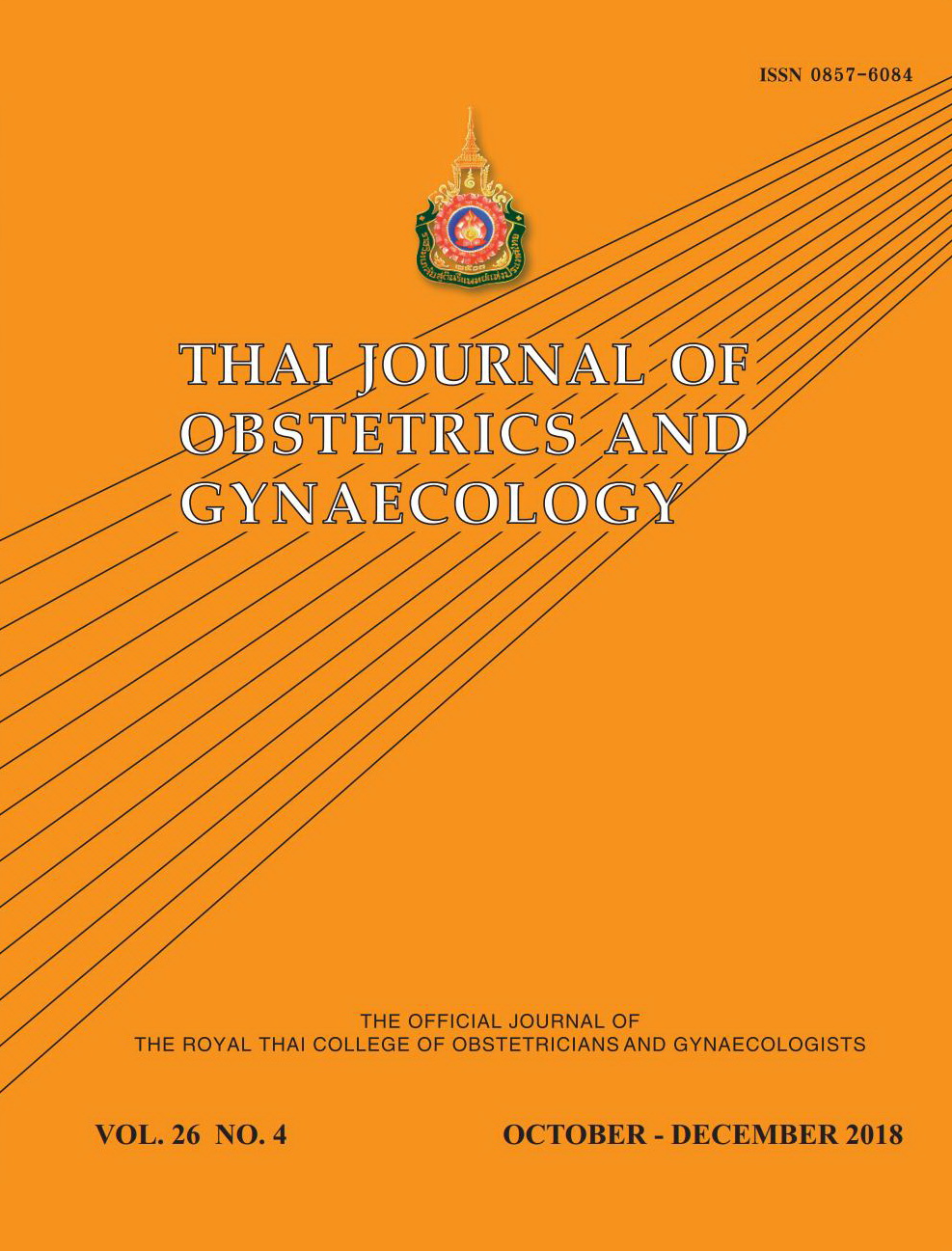Effects of Gestational Weight Gain on Pregnancy Outcomes According to Siriraj Recommendations in Thai Obese Women
Main Article Content
Abstract
Objectives: To evaluate the effect of gestational weight gain on maternal and fetal outcomes according to Siriraj recommendations in Thai obese women.
Materials and Methods: This was a retrospective cohort study of obese Thai women with term-singleton pregnancy. We used The Regional Office for Western Pacific Region of WHO (WPRO) BMI criteria for Asians to define obesity. Data was collected from 1 January 2014 to 31 December 2015. Three hundred and eighty patients were included into this study, 235 patients were in obese class I (BMI 25-29.9 kg/m2) and 145 patients were in obese class II (BMI >30 kg/m2). Statistical analyses of adverse maternal and neonatal outcomes between excessive gestational weight gain (GWG) and normal GWG, based on Siriraj recommendations, were assessed.
Results: When compare with normal GWG group, excessive GWG in obese class I and obese class II had greater risk of adverse neonatal outcomes including large for gestational age (LGA), macrosomia and higher birth weight, with statistical significance. Excessive GWG in obese class I and obese class II also had statistically-significant higher risk of adverse maternal outcomes, including severe preeclampsia, postpartum hemorrhage (PPH), cephalopelvic disproportion (CPD) and increased rate of cesarean delivery.
Conclusion: Obese Thai women with term-singleton pregnancy should have GWG according to Siriraj recommendations. Excessive GWG women were associated with increased risk of LGA, macrosomia and higher birth weight. Adverse maternal outcomes were also greater including preeclampsia, PPH, CPD and increased rate of cesarean section.
Article Details
References
2. Wibulpolprasert S. Thailand Health Profile 2005-2007. Bangkok: Printing Press, The War Veterans Organization of Thailand 2008.
3. Haffner S, Taegtmeyer H. Epidemic obesity and the metabolic syndrome. Circulation 2003;108:1541-5.
4. Cunningham FG, Leveno KJ, Bloom SL, Spong CY, Dashe JS, Hoffman BL.Williams obstetrics. 24th ed. New York: McGraw Hill;2014.
5. Ovesen P, Rasmussen S, Kesmodel U. Effect of prepregnancy maternal overweight and obesity on pregnancy outcome. Obstet Gynecol 2011;118:305-12.
6. Mamun AA, Callaway LK, O’Callaghan MJ, Williams GM, Najman JM, Alati R, et al. Associations of maternal pre-pregnancy obesity and excess pregnancy weight gains with adverse pregnancy outcomes and length of hospital stay. BMC Pregnancy Childbirth 2011;11:62.
7. World Health Organization. The Asia-Pacific perspective: redefining obesity and its treatment February 2000. Sydney: Health Communications Australia 2000.
8. Flick AA, Brookfield KF, Torre LI, Tudela CM, Duthely L, González-Quintero VH. Excessive weight gain among obese women and pregnancy outcomes. Am J Perinatol 2009;27:1-7.
9. Rasmussen KM, Abrams B, Bordnar LM, Bouchard C, Butte N, Catalano PM, et al. Weight gain during pregnancy: reexamining the guidelines. National Academy of Sciences [Internet].2009[cited 2017 April 28]. Available from: www.nap.edu.
10. Sansaneevithayakul P, Titapant V, Ruangvutilert P, Sutantawibul A, Phatihattakorn C, Wataganara T, et al. Relation between gestational weight gain and pregnancy outcomes. J Obstet Gynaecol Res 2014;40:995-1001.
11. Black MH, Sacks DA, Xiang AH, Lawrence JM. The relative contribution of pre pregnancy overweight and obesity, gestational weight gain, and IADPSG-defined gestational diabetes mellitus to fetal overgrowth. Diabetes Care 2013;36:56-62.
12. Thaithumyanon P, Bhongvej S, Chitinand S. Intrauterine growth in Thai population. J Pediatr Soc Thai 1984;23:99-106.
13. Cohen W, Friedman EA. Management of Labor. Baltimore, University Park Press, 1983
14. Spong CY, Berghella V, Wenstrom KD, Mercer BM, Saade GR. Preventing the First Cesarean Delivery: Summary of a Joint Eunice Kennedy Shriver National Institute of Child Health and Human Development, Society for Maternal-Fetal Medicine, and American College of Obstetricians and Gynecologists Workshop. Obstet Gynecol 2012;120:1181-93.
15. Nielsen LS, Michaelsen KF, Gamborg M, Mortensen EL, Sorensen TIA. Gestational weight gain in relation to offspring body mass index and obesity from infancy through adulthood. Int J Obes(Lond) 2010;34:67-74.
16. Costa BMF, Paulinelli RR, Barbosa MA. Association between maternal and fetal weight gain: cohort study. Sao Paulo Med J 2012;130:242-7.
17. Jin WY, Lv Y, Bao Y, Tang L, Zhu ZW, Shao J, et al. Independent and combined effects of maternal prepregnancy body mass index and gestational weight gain on offspring growth at 0-3 years of age. Biomed Res Int 2016; 2016:1-10.
18. Gilbert WM, Nesbitt TS, Danielsen B. Associated factors in 1611 cases of brachial plexus injury. Obstet Gynecol 1999;93:536-40.
19. Sheiner E, Sarid L, Levy A, Seidman DS, Hallak M. Obstetric risk factors and outcome of pregnancies complicated with early postpartum hemorrhage: a population-based study. J Matern Fetal Neonatal Med 2005;18:149-54.
20. Stotland NE, Cheng YW, Hopkins LM, Caughey AB. Gestational weight gain and adverse neonatal outcome among term infants. Obstet Gynecol 2006;108:635-43.
21. Hardy OT, Czech MP, Corvera S. What causes the insulin resistance underlying obesity? Curr Opin Endocrinol Diabetes Obes 2012;19:81-7.
22. Nohr EA, Vaeth M, Baker JL, SørensenTIa, Olsen J, Rasmussen KM. Combined associa-tions of prepregnancy body mass index and gestational weight gain with the outcome of pregnancy. Am J Clin Nutr 2008;87:1750-9.
23. Swank ML, Marshall NE, Caughey AB, Main EK, Gilbert WM, Melsop KA, et al. Pregnancy outcomes in the super obese, stratified by weight gain above and below institute of medicine guidelines. Obstet Gynecol 2014;124:1105-10.
24. Crane SS, Wojtowycz MA, Dye TD, Aubry RH, Artal R. Association between prepregnancy obesity and the risk of cesarean delivery. Obstet Gynecol 1997;89:213-6.
25. Pongchaiyakul C, Nguyen TV, Kosulwat V, Rojroongwasinkul N, Charoenkiatkul S, Pongchaiyakul C, et al. Defining obesity by body mass index in the Thai population: an epidemiologic study. Asia Pac J Clin Nutr 2006;15:293-9.
26. Tanentsapf I, Heitmann BL, Adegboye AR. Systematic review of clinical trials on dietary interventions to prevent excessive weight gain during pregnancy among normal weight, overweight and obese women. BMC Pregnancy Childbirth 2011;11:81.

